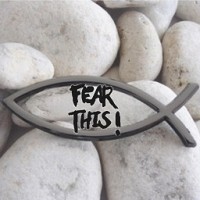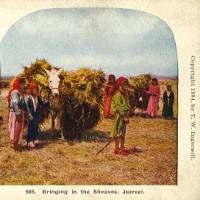Luke 18:35 As Jesus approached Jericho, a blind man was sitting by the roadside begging. 36 When he heard the crowd going by, he asked what was happening. 37 They told him, “Jesus of Nazareth is passing by.” 38 He called out, “Jesus, Son of David, have mercy on me!” 39 Those who led the way rebuked him and told him to be quiet, but he shouted all the more, “Son of David, have mercy on me!” 40 Jesus stopped and ordered the man to be brought to him. When he came near, Jesus asked him, 41 “What do you want me to do for you?” “Lord, I want to see,” he replied. 42 Jesus said to him, “Receive your sight; your faith has healed you.” 43 Immediately he received his sight and followed Jesus, praising God. When all the people saw it, they also praised God.
Ironically, even as a blind man, he saw more clearly than those around him whose sight was ostensibly 20/20.
The crowd of people walking with Jesus only said “Jesus of Nazareth is passing by.” The blind man saw deeper, presumably having heard that this is no mere man from Nazareth. He sees Jesus as the Son of David–a Messianic term.
When he calls out “Jesus, Son of David, have mercy on me!” he’s confessing that Jesus has the power to heal his blindness. The blind man sees. The seeing crowd is still blind. The crowd rebuked the blind man and tried to silence him. The more they rebuked, the more persistent the blind man became, seeing that encountering Jesus could make a profound impact on his life because of who Jesus is: Jesus, the Messiah, Son of David, Son of God.
The crowd wants him quiet, but the man shouted all the more. Far from disrespectful, it’s a bold and confident proclamation that God’s promised Messiah is in his midst. He sees spiritually: Cry Out, Have Mercy! Jesus stops and…orders, commands…that the man be brought near. Jesus doesn’t run from people in dire straits. He draws them near.
In response to the man’s cry for mercy, Jesus asks “What do you want me to do for you?” The blind man responds, “Lord, I want to see.”
- In stating this, the blind man demonstrates his knowledge that Jesus, the Son of David heals people.
- He wants Jesus to use that same power on his behalf so that he can see.
- But Jesus does more than give him use of his two eyes. He affirms the man’s faith showing that he’d had spiritual sight all along.
- In Jesus’ drawing out a public declaration of what he obviously wanted, Jesus pronounced in the presence of the crowd that his faith has healed him.
- The man sees and instantly follows Jesus, giving glory to God. This is the Blessed Fear. Praise God from Whom All Blessings Flow.
Scripture says, “When all the people saw it, they also praised God.” I wonder if that’s the moment when the rest of the people began Seeing Spiritually.









